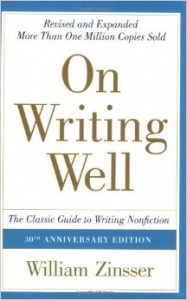On Writing Well by William Zinsser
Written by Ashley Kelmore, Posted in Reviews
How appropriate that this is my 500th post.
Five stars
I love participating in Cannonball Read for a few reasons. I didn’t know AlabamaPink, but I followed her on Pajiba and am happy to support fundraising in her name. I love that CBR motivates me to pick up a book instead of a video game or magazine, and I know I wouldn’t have read nearly as many (mostly good) books in the last 18 months without it. But one benefit I didn’t fully understand until recently is that CBR gives me the chance to improve my non-fiction writing on a weekly basis. This latest read has been particularly useful with that goal.
My husband read ‘On Writing Well’ and thought I’d enjoy it. It bodes well for a book that aspires to be a guide to writing nonfiction that it is so easy to read. Mr. Zinsser wrote the first edition of this book in 1976, but has updated it many times, most recently about eight years ago. It is well-organized, fun to read, and most importantly filled with fantastic advice, as my notebook filled with quotes from it confirms.
A few of Mr. Zinsser’s suggestions are obvious, but that doesn’t mean most people actually follow them. One thing he pushes for repeatedly is to take a stand and remove the passive voice. Until graduate school many of my instructors required that I write in the passive voice; thankfully that changed but I still find myself having to work at using my voice in my writing, especially at work. I don’t think I’m alone in that, and it’s nice to get some advice on being even stronger with my word choice.
But there’s so much more in this book than Mr. Zinsser’s enthusiasm for active sentences. He provides great examples to support his point that we should be crafting sentences, paragraphs and pieces that readers want to read. We shouldn’t be looking for the longest synonym or the most clauses in a sentence; we should tell the story in a way that works for us. He offers great advice to get us there; a few of my favorites are:
• “What do your readers want to know next? Ask yourself that question after every sentence.”
• “Examine every word you put on paper. You’ll find a surprising number that don’t serve any purpose.”
• “Most adverbs and adjectives are unnecessary.”
• “Clarity, simplicity, brevity and humanity.”
Unfortunately, while Mr. Zinsser understands and reinforces the power of language, he seems to only allow that power in so far as he agrees with it. He mentions that he used to use ‘he’ as his generic pronoun, but feminists convinced him that such usage was sexist, and so he changed his style. He saw that not using a gender-neutral form whenever possible reinforced the idea that male is the default, and female the anomaly. But in other areas he suggests that being careful with language is just ‘political correctness’ and dismisses it. The specific example he uses – expressing his distaste for the term undocumented resident and preference for the term illegal alien – shows that he still chooses his words based on his political inclination. He sees the error in his ways on gender, but apparently not yet on nationality. That is disappointing.
Despite that one (important) area where Mr. Zinsser and I disagree, I know that much of what he wrote is solid advice. Hopefully as I incorporate his suggestions my writing – for Cannonball Read, for work, and for my own blog – will improve. Or, I should say, I will improve my writing.

